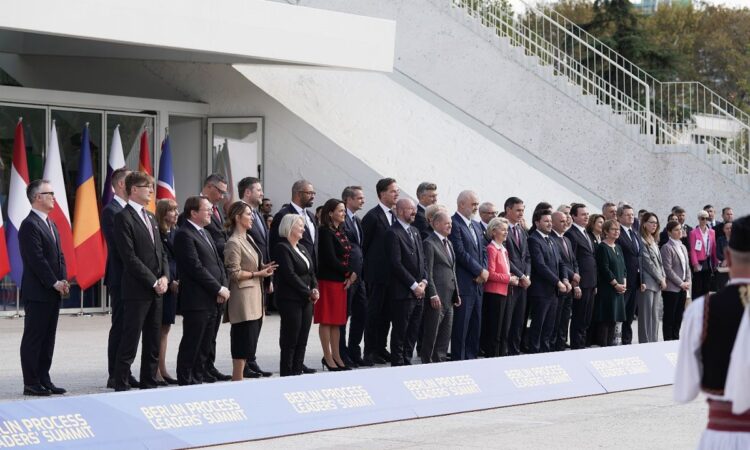
By: Florian Bieber, Nikola Dimitrov, and Michael Emerson
In its ‘Enlargement Package’ of November 2023 the European Commission published a significant new Growth Plan initiative to enhance the preparedness of the Western Balkans for accession to the EU. A financial offer of up to €6 billion for the years 2024 to 2027 is proposed, subject to fulfillment of conditions to be specified in Reform Agendas.
Positive aspects
The idea that the advantages of membership should be built up progressively alongside increasing preparedness for membership, rather than all held up until the day of accession, is well justified. The burden of becoming compliant with all EU law and policies is extremely heavy and the time needed to do this takes many years. Furthermore, full EU membership has become ever more elusive, conditioned with parallel and politically challenging EU internal reforms with an uncertain outcome. This strains political capacities to sustain the process.
The Growth Plan thus aims to deliver useful financial advantages progressively in step with negotiated packages of measures increasing compliance with EU norms and regulations. It is intended to restore tangible incentives to progress with reforms. It also represents some movement by the Commission in the direction of independent proposals to reform the enlargement methodology, notably under the heading of Staged Accession. Furthermore, it makes a modest contribution toward closing the gap in the funds made available to member states, such as Croatia vis-à-vis accession countries. While its goal to contribute to greater economic convergence might be overly ambitious, it can at least help avoid the gap between the six Western Balkan countries and its EU neighbors increase.
Weaknesses
The initiative has drawn mixed reactions in the region. While the region’s leaders welcomed the initiate at an informal gathering in late January in Skopje, many observers have dismissed the initiative as either old money in new wrapping, or for offering easy money with only loose accession conditionality. The growth plan does provide for substantial additional funds for the region. However, as a recent opinion of the Court of Auditors notes, there is a risk that the conditions for the plan are not ambitious enough and cannot be properly measured.
In addition to the weakness identified by the Court of Auditors, the proposal as it stands has another serious drawback. The Growth Plan has no connection with the progress required under the formal accession process, based on the opening and closing of 35 chapters grouped into clusters. As so far presented it looks like a separate track to have a life of its own, in parallel with that of the formal enlargement methodology.
The Commission can surely say that successes in implementing the Reform Agendas of the Growth Plan can fit perfectly with the steps needed to close various chapters. But the processes are still only parallel. Delivery on Growth Plan conditions, even when formally agreed by the Commission to trigger financial payments, has according to the present Commission proposal no direct impact on the accession negotiations about chapters and clusters with the member states in the intergovernmental conferences.
Correcting the flaws
These serious flaws should and could quite easily be rectified. For example, the detailed conditions set out in the required Reform Agendas could be summarized as commitments to raise the ratings of specified chapters as seen in the Enlargement Package reports. More precisely these voluminous reports currently summarise the state of play of each chapter on a five-level scale assessment of preparedness for accession: 1 Early, 2 Some, 3 Moderate, 4 Good, 5 Advanced. Thus a given Reform Package would aim summarily to raise the ratings for chapters X, Y and Z from ‘Moderate’ to ‘Good’, etc; while underlying this there would for each selected chapter be a listing of planned actions, following recommendations in the Commission’s reports.
This would create objective foundations for achievements under the Growth Plan to impact the formal enlargement process. While EU member states would retain their power to decide over the chapters and clusters, successes in implementing the Growth Plan would at least create a well-structured presumption in favour of consistent decisions by the Council that are today chronically over-burdened with political considerations.
Without this link the proposal would seem like a substitute to the accession process rather than a boost to it, thus reducing the incentives to focus on EU accession, and disempowering political actors who are pushing for accession.
This should go with another long overdue reform to switch decision-making in the Council on chapters and clusters onto a qualified majority basis, rather than the currently paralyzing unanimity requirement.
Discretionary use of individual veto rights over issues unrelated to the Copenhagen criteria, as in the notorious case of Bulgaria’s treatment of North Macedonia, compromises the merit-based nature of the accession process, destroying its conditionality and credibility. It averts attention from the heart of the process – reforms – both in the candidate countries and the EU alike. Switching to qualified majority in the intermediary stages is legally a simple matter for the Council to decide, without requiring legislation, treaty change or ratification.
Florian Bieber is Professor for Southeast European History and Politics at the University of Graz and coordinator of the Balkans in Europe Policy Advisory Group (BiEPAG); Nikola Dimitrov is President of Solution – Balkan Center for constructive policies, and former minister of foreign affairs of North Macedonia; Michael Emerson is Associate Senior Research Fellow at the Centre for European Policy Studies (CEPS), Brussels.






